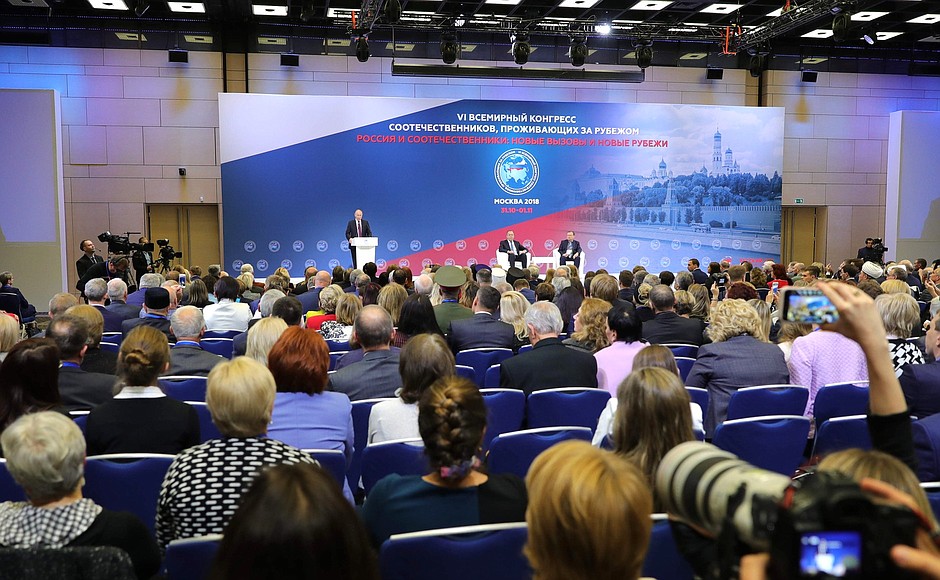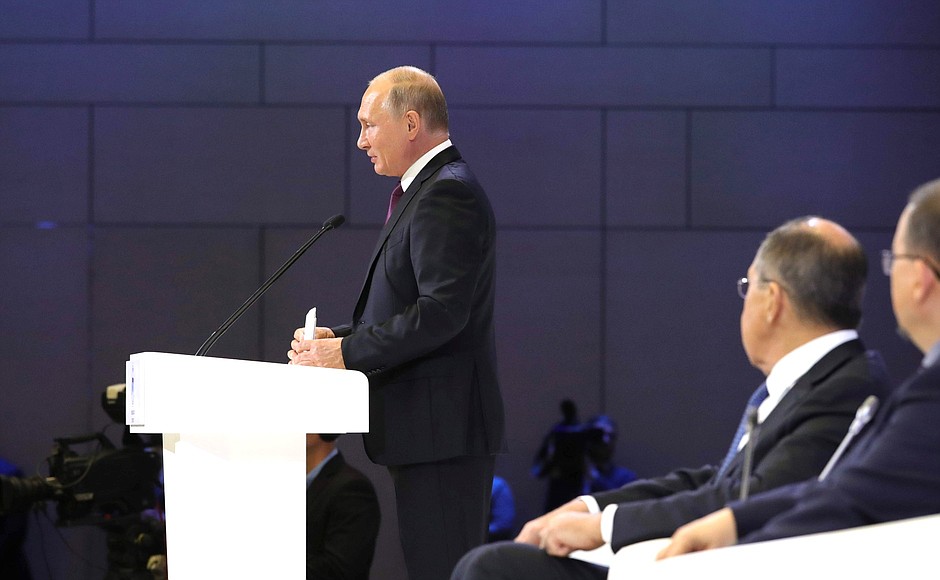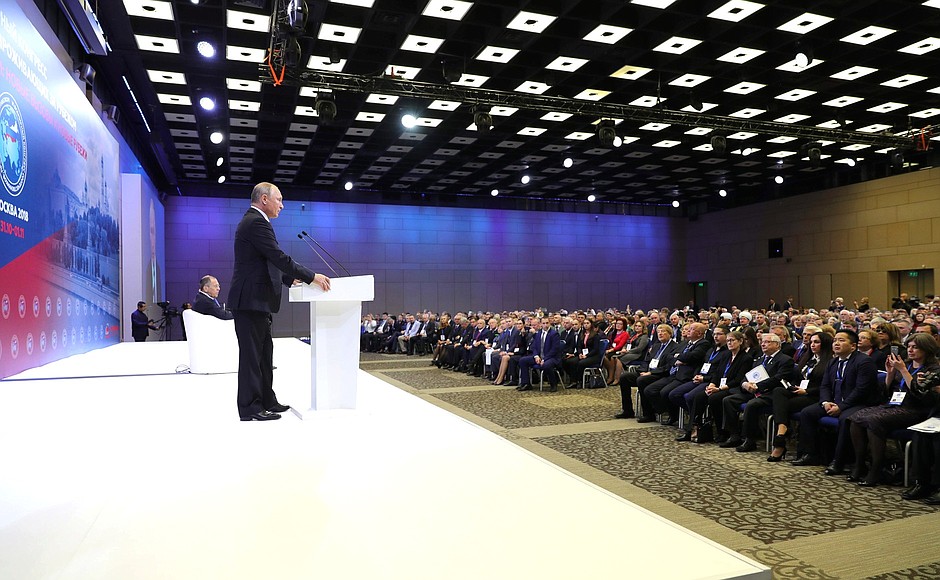During his address, the President announced the approval of the State Migration Policy Concept of the Russian Federation for 2019–2025.
* * *
President of Russia Vladimir Putin: Good afternoon, friends,
I am delighted to welcome the participants of the 6th World Congress of Compatriots.
It is symbolic that this Congress has met ahead of the National Unity Day. This holiday was established to celebrate the glorious deeds of our forefathers and unbreakable bonds between all generations that remain loyal to their homeland and uphold their traditional values and common ideals irrespective of the country they live in.
See also
Over 700 people from many countries are attending this Congress. At the same time, all of you together represent the tight-knit community of Russian compatriots and the huge united Russian world, which was never based exclusively on ethnic, national or religious principles. It has brought together and united all those who are connected to Russia spiritually, who feel a spiritual link to our homeland, and who consider themselves to be Russian speakers and the carriers of Russian culture and history.
I would like to express my sincere gratitude to you for your involvement in the life of Russia, for your invariable support and for your solidarity. We are grateful for your contribution to the promotion and advancement of our rich historical and cultural heritage and everything else that constitutes our national Russian identity.
An important role in this is played by Russian cultural institutions abroad: theatres, libraries, and museums. Many of them are created and supported by our compatriots abroad.
I cannot fail to note the role of the media. Without them, many useful initiatives to expand the Russian-speaking space would not have the desired effect.
I would like to sincerely thank philologists, teachers, literary critics and enthusiasts who help us in organising the international celebrations of our outstanding writers’ anniversaries: Leo Tolstoy, Ivan Turgenev, Alexander Solzhenitsyn and many others.
I am also pleased to announce that a modern, state-of-the-art building of the Alexander Solzhenitsyn House of Russian Expatriates has been built in Moscow. Its collection is now being finalised. Compatriots donated priceless relics, evidence of dramatic events in the history of our country to the museum.
The museum will open its doors to visitors in spring 2019, and I am sure it will become one of the leading intellectual and cultural centres of Russia, a platform for fruitful dialogue with our compatriots all over the world.
Friends, all of this is especially important now that we are dealing with the issues that will directly affect the future of Russia and other countries. The international situation is far from simple. Tensions and unpredictability are growing. The foundations of international law are being eroded, and long-term agreements between states are crumbling.
Russophobia and, regrettably, other forms of extreme aggressive nationalism are being employed. There is no concealing the fact that a war on memorials and the Russian language is underway in Ukraine, the Baltics and several other countries. People are being intimidated and even terrorised. A natural desire to preserve one’s ethnic roots is denounced as a crime and a form of separatism. The freedom of speech and the right to keep up one’s traditions are defied. Some of our compatriots have been denied the right to practice their professions for political reasons.
Many people are feeling the consequences of this harsh pressure.
We will firmly defend your rights and interests, using all the available bilateral and multilateral mechanisms at our disposal. We will continue to provide assistance to the Foundation for Supporting and Protecting the Rights of Compatriots Living Abroad, which has helped establish 26 legal aid centres in 20 countries. It has allocated grants to some 200 projects and organised over 50 events, including courses for young human rights advocates. Professional legal assistance has been provided to over 70,000 people, including in such trouble spots as Syria, Yemen and Libya.
As I said, the preservation and promotion of the Russian language is among our priorities. Towards this end, the Federal Agency for the CIS Affairs, Compatriots Living Abroad, and International Humanitarian Cooperation (Rossotrudnichestvo) alone helps some 5,000 preschool and secondary school teachers receive advanced training every year.
Measures are being taken to support Russian language teachers. Starting in 2017, Russia’s Education Ministry sends Russian language teachers to six cities in Tajikistan and provides assistance to the Alexander Pushkin Russian-Turkmenistani School in Ashgabat.
The Pushkin Institute Partner Network has been established to facilitate access to Russian language tuition programmes. Over 80 language centres around the world have been created within the framework of this partner network.
We are increasing the delivery of textbooks, fiction and teaching aids to educational establishments. Youth Olympiads are held regularly, and their winners are invited to study at the top Russian universities.
I would like to highlight the efforts of the Russky Mir Foundation, which annually organises large-scale assemblies in Russia. This year’s assembly is scheduled for November 2–4 in Tver.
The Foundation has established over 250 Russian Centres and “Russian World rooms” in 70 countries, including 12 in the past three years. One of them is located at the University of Damascus in Syria. Over one million people were involved in the Foundation’s events in 2018.
We do not want young compatriots living abroad to lose their roots, their Russian essence and their ties with the Motherland. Therefore the youth is among the most popular areas of focus in our work.
We would like as many young compatriots as possible to visit Russia, learn about its achievements, its life today, to meet with their peers and launch joint projects and initiatives.
We help young people establish contacts, including business and professional contacts, and to join the volunteer movement. The 2017 World Festival of Youth and Students in Sochi played an important role in this respect.
Educational trips to historical sites, including Hello, Russia!, the World Games of Young Compatriots and the Workshop of Meanings online educational resource remain highly popular.
I would like to emphasise that since early 2018 our compatriots are free to take part in the Leaders of Russia competition of next generation leaders. This is a good opportunity to receive quality professional training and to realise one’s ambitions.
I must also say a few more words about the efforts of the Russian Orthodox Church and other traditional national confessions, including Islam, Judaism and Buddhism. I can see many representatives of these religions in this hall, and I would like to welcome them. I want to thank them for their efforts to strengthen cultural and humanitarian ties between our compatriots abroad and Russia. Unfortunately, some are now trying to sever these ties, one way or another, and to force these people to stay in their respective countries. I would like to note one thing: political intrigues in this sensitive sphere have always spelled dire consequences, primarily for those who are doing this. It is our shared duty (to the people, in the first place) to do everything possible to preserve spiritual and historical unity.
Friends,
Russia has a strong economic and humanitarian potential. And, as I said in the Address to the Federal Assembly, its positions and role in the world are determined by the people and the conditions that we create for their self-fulfilment and creativity.
We are facing large-scale tasks to ensure breakthrough, sustainable long-term growth. I am sure that our compatriots can make a great contribution to this constructive work.
We are primarily counting on your involvement in promoting cooperation projects with Russia. However, frankly, circumstances could develop in different ways. Therefore, we will be happy to see those who want to come to us on a temporary basis, as well as those who apply for citizenship and permanent residence in Russia. As for those illegally persecuted, those in danger, we will make every effort to ensure their protection and provide a shelter.
Today I have signed a new edition of the State Migration Policy Concept. It is aimed, among other things, at creating more comfortable conditions for our compatriots from abroad to move to Russia for permanent residence, as well as at creating clear rules for entry and entitlement to residence, work, and Russian citizenship.
We have removed many problems and bureaucratic barriers in this sphere that our compatriots have rightly mentioned. In any case, I hope we have tried to remove them and de-bureaucratise the system. We still need to see how it works in practice. We will continue moving in this direction.
Furthermore, we will continue to improve the state programme to facilitate the voluntary resettlement of compatriots living abroad to the Russian Federation. Allow me to note that about 800,000 people have moved to 66 Russian regions in the past 12 years that the programme has been in force.
We can see that in recent months, the number of people wishing to return to their homeland has been growing. We will continue to facilitate the process of adaptation, to simplify procedures, together with regional and local authorities, businesses, and public associations, to work on improving the quality of life of displaced persons, to create jobs for them, and to improve the conditions for doing business.
I know first-hand that there are still many problems here. We will analyse these problems together and get rid of them.
Friends,
In conclusion, I would like to emphasise that we genuinely want you to be successful, prosperous and happy. And whichever country you live in, we are always ready to give you every possible support.
We know that you are doing all you can to strengthen the Russian world, and to establish a constructive dialogue between countries. I would like to assure you that this is our common goal.
I would like to wish the Congress participants fruitful work and interesting discussions. All the best to you and your families.
Thank you.


